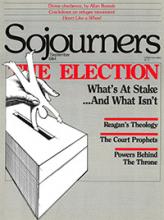In July 1979 the South African Council of Churches (SACC) held a meeting with the theme "The Church and the Alternative Society" with Rev. Allan Boesak, a black Reformed minister and theologian, as the keynote speaker. At that meeting the SACC adopted a resolution encouraging Christians to engage in acts of civil disobedience against apartheid laws, a step Boesak had called for in his address.
Subsequent to that meeting, South African Minister of Justice Alwyn Schlebusch issued a warning that the South African government was becoming impatient with statements like the SACC resolution that "posed a threat to the stability of South African society." In response Allan Boesak wrote the following letter to Minister Schlebusch. The letter is included in Boesak's new book, Black and Reformed.—The Editors
The Honourable A. Schlebusch
Minister of Justice
Union Buildings
Pretoria
Dear Sir,
A short while ago you thought it your duty to address the South African Council of Churches, as well as church leaders, very sharply and seriously over radio and television and in the press in connection with the SACC resolution on civil disobedience. Although the resolution was not taken as a direct result of my address, I did express my point of view openly on that occasion, and I am one of those who support the SACC in this respect.
You are the minister of justice, and it is in this capacity that you have issued your serious warning. I take your words seriously. Hence my reaction, which I express to you respectfully and which I ask you to read as a personal declaration of faith.
Your warning has become almost routine in South Africa: the government continually says to pastors and churches that they must keep themselves "out of politics" and confine themselves to their "proper task": the preaching of the gospel.
Read the Full Article

